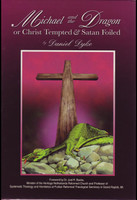
The Mystery of Self-Deceiving (Dyke)
"A Book which will be owned for a truth, whilst men have any badness; and will be honored for a treasure, whilst men have any goodness in them." - Thomas Fuller
"Protestantism has produced no other treatise in which the psychology of sin was more exhaustively treated than in Dyke's Mystery of Self-Deceiving. This book assumes that in order to be able to deal with man's religious difficulty one must first understand it fully. It then proceeds to dissect the human heart fibre by fibre and cell by cell. No corner is left unexplored, no crevice forgotten, no raw nerve kept mercifully unexposed. Sin's devious subterfuges and disguises are discovered and labelled, their specific causes and results catalogued. Various deceits and follies of man are examined minutely both with regard to omission and commission. Dyke's analyses are prehaps the most acute which can be found among the various diagnosticians of the spiritual life."
Daniel Dyke's great concern throughout the work is the deceitfulness of the heart and its proneness to self-deception in regards to both the daily sins we commit and also the salvation of the soul. False gospels have so permeated the Christian church that almost anyone who has the least inclination of affection towards Christ is pronounced saved simply by repeating the words of a prescribed prayer. There is no conviction of sin and no repentance. The sin in the heart is never dealt with. False gospellers talk of simply making 'a decision for Christ,' while Jesus Christ talked about denying self and laying down one's life to follow Him.
Author
Daniel Dyke was an English Puritan. He was highly respected among the Puritans as a solid, educated divine. He preached soundly and experientially, aiming to promote biblical, Reformed piety. John Wilkins, born the year of Dyke’s death and later the bishop of Chester, regarded Dyke’s sermons as “among the most excellent in his day.”





